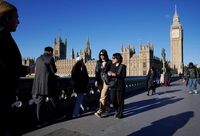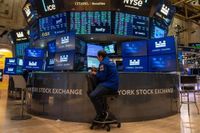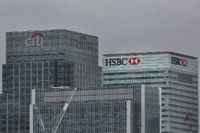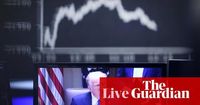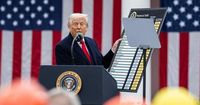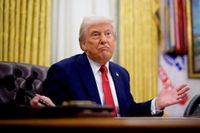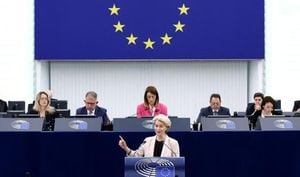Global markets reacted sharply on Thursday, April 3, 2025, following a sweeping announcement of tariffs by US President Donald Trump, which has sent the FTSE 100 and other major European indices into a downward spiral. Investors are scrambling for safety, with stocks plummeting as concerns about a potential trade war loom large.
During a press conference at the White House, Trump declared a "liberation day" for the US economy, unveiling a 25% tariff on all foreign-made automobiles and a 10% baseline tariff on all imports into the country. The tariffs on specific countries were particularly severe, with China facing a staggering combined tariff burden of 64%, Japan incurring a 24% duty, and the European Union subject to a 20% levy. The UK was not spared, with a 10% tariff announced on imports from Britain.
Ursula von der Leyen, President of the European Commission, warned that these tariffs represent a "major blow" to the world economy, stating that the plan "will be dire for millions of people around the world." The immediate market reaction reflected widespread alarm, with the FTSE 100 index falling by 1.5% during early trading, as the announcement triggered a global selloff.
London's benchmark index (^FTSE) was down 1.5% at noon, with mining companies and banks among the hardest hit. Shares in Europe’s largest lender, HSBC, dropped over 5%, while Barclays and Standard Chartered saw declines of more than 4% and 7%, respectively. Analysts, including Dan Coatsworth from AJ Bell, noted that the uncertainty surrounding the global economy due to the tariffs is causing investors to shy away from banking stocks, despite their generous dividends.
In addition to the FTSE 100, Germany's DAX (^GDAXI) and France's CAC (^FCHI) were also down 1.5% and 1.6%, respectively. The pan-European STOXX 600 (^STOXX) index fell by 1.2% as markets braced for the potential fallout from the tariffs.
Wall Street was set for a negative start, with futures for the S&P 500, Dow Jones, and Nasdaq all indicating declines. The S&P 500 futures were down 3.4%, while the tech-heavy Nasdaq 100 was projected to plunge 3.9%. This reaction comes after a tumultuous trading session where major tech stocks, including Apple, saw significant losses, with Apple's market capitalization dropping by approximately $240 billion due to a 7.14% decline.
Market analysts have expressed concerns about the broader implications of these tariffs. John Authers from Bloomberg Opinion criticized the "bizarre mathematics" used to calculate the tariffs, suggesting that the arbitrary nature of the rates could lead to further trade tensions. He emphasized that the lack of a serious basis for the tariffs raises questions about their long-term viability.
As the markets opened, the FTSE 100 fell sharply, reflecting fears of a global downturn. Mining companies like Anglo American and Antofagasta were among the biggest fallers, with declines of 4.7% and 4.6%, respectively. The financial sector also faced significant pressure, with Barclays and HSBC seeing their shares drop by 4.1% and 3.5%.
In a statement, Daniel Murray, Deputy CIO & Global Head of Research at EFG, noted that the risk of a US and global recession has increased as a direct result of the tariffs. He warned that the likelihood of stagflation poses significant challenges for central banks, as they navigate the economic landscape shaped by these new trade policies.
Meanwhile, the British pound experienced a surge against the US dollar, rallying 1.2% to reach $1.3153. This rise came amid a flight to safety, as investors sought refuge in gold and other stable assets. Gold prices hit record highs as uncertainty gripped the markets.
In response to the tariffs, UK Prime Minister Sir Keir Starmer emphasized that decisions would be guided by the national interest. He acknowledged the economic impact of the US's actions and stated that the UK government would strive to maintain a cool head in the face of rising tensions.
Starmer's government is reportedly considering various measures to respond to the tariffs, including potential negotiations with the US to mitigate the impact on British businesses. Business Secretary Jonathan Reynolds expressed disappointment over the tariffs, stressing that any barriers to trade with the US, a key trading partner, pose a significant challenge.
As the situation unfolds, analysts are predicting further volatility in the markets, with potential retaliatory measures from affected countries looming on the horizon. The uncertainty surrounding Trump's tariff strategy is expected to keep investors on edge, as they navigate this new economic landscape.
While some sectors, such as pharmaceuticals, appear to have escaped the worst of the tariffs, the overall sentiment remains cautious. Companies like AstraZeneca and GSK have seen their shares rise slightly, as they assess the implications of the new tariffs on their operations.
As the dust settles from this unprecedented tariff announcement, the global economy faces a period of heightened uncertainty. With trade relationships being re-evaluated and markets reacting swiftly, the coming weeks will likely reveal the true impact of Trump's "liberation day" tariffs on the international stage.
